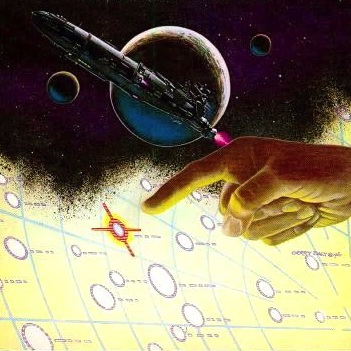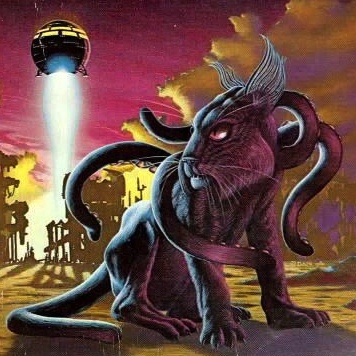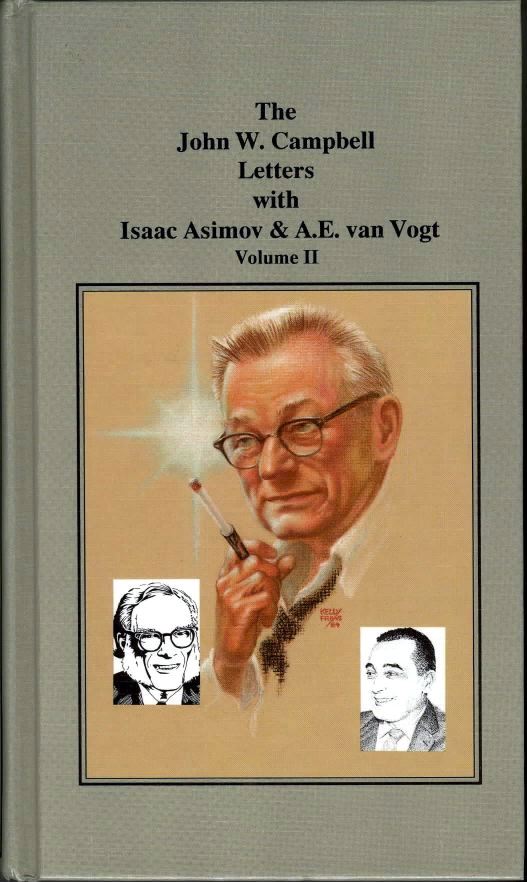Isaac's Note: Anyone discussing the authorship of the E. Mayne Hull stories must prioritize sources, form elaborate theories, and explain away select "facts" that contradict each other. Considering the nebulous and volatile nature of this issue, I think it's worthwhile to present a viewpoint differing from my own — and I freely admit that even my own opinion on the matter tends to wobble around a bit from day to day!
Shortly after my essay on this issue first appeared, I received an email from fellow van Vogt reader Don Ketchek that raises several excellent points, and I subsequently got his permission to reproduce his essay here. I'd like to thank Don for letting me share his thoughts with others. I have yet to systematically re-read Hull's stories, so I found that his comments in this area were particularly interesting.
I read with interest Isaac's article on the stories of E. Mayne Hull and the theory that they were in fact written by van Vogt. It prompted me to go back and reread some of these stories, as well as van Vogt’s chapter on her writings in his autobiography. I would like to make the following comments:
Van Vogt seems to me, having read countless interviews as well as his autobiography, to be about as straightforward and honest as a person can be. It is hard to see where he would devote a chapter of his autobiography to the writing processes of his wife if he was using her name strictly as a pen name. Why not just avoid the topic altogether if there is a secret to be held? Therefore I am compelled to believe there is at least some truth to E. Mayne Hull being involved in writing the stories credited to her.
I have not seen the letters Campbell wrote (in volume 2 of the Campbell Letters) where he discusses the use of a pen name for van Vogt, but I offer the possible explanation. Van Vogt, in an effort to please Campbell, tries to comply with more stories. But van Vogt, by his own statements, is a very slow writer. At the time of Campbell’s first suggestion of a pen name, van Vogt’s stories have appeared in only 10 of the 24 issues since his debut. It is possible that the only way he can send more stories to Campbell is to collaborate. There is already one famous husband-wife writing team submitting SF for Campbell — Henry Kuttner and C.L. Moore (and there might have been others) —so it seems like a possible solution for van Vogt is to collaborate with his wife. Based on the quotes Isaac has presented from Campbell’s letter’s, if this is so, he does not tell Campbell, who believes the stories are van Vogt’s own, based on the fact that it is Campbell that seems to decide that the pen name should be used for "The Flight That Failed."
In rereading some of the stories, the issue gets cloudier. The earliest stories, "The Flight That Failed" and "Abdication" (the first of the Artur Blord stories) seem in spots to have the van Vogt feel, but for the most part seem to be written in a different style. This is especially true of "Abdication." Now mind you, this is purely a gut feeling. I have not analyzed them for 800-word scenes or any other van Vogt trademark techniques. Once I read the second Blord story, however, it felt like pure van Vogt. And the rest of the Blord stories and especially The Winged Man also read like van Vogt. There is no doubt that the final draft is van Vogt’s, but my guess is that the plot, and perhaps a first draft, were written by Hull. One reason I come to that conclusion is that the Hull stories as a whole are not that good. The plots are more straightforward and without those dreamlike changes that van Vogt’s stories are famous for. The readers seemed to think so too. "The Flight That Failed" failed to be among the top 5 stories (out of 7) that readers ranked in the Analytical Laboratory. "Abdication" ranked last (out of 5 stories) in the Analytical Laboratory of its issue of Astounding.
That brings me to The Winged Man which offers the best evidence for both arguments! The Winged Man appears in May and June 1944. There are no van Vogt stories in May, June or July, leading one to believe that since there are no van Vogt stories being written in the same time period, he must be writing The Winged Man. Yet, since there are no van Vogt stories being printed in May, June or July, there is no reason for Campbell to use a pen name for The Winged Man. It is not part of the Blord series, and in fact, it is a far future tale of adventure more in the vein of van Vogt then any of the Hull stories. Since van Vogt was far more popular than Hull, Campbell would have every reason to use van Vogt’s name on the byline as well as on the cover. Van Vogt’s name would definitely sell more copies, not a minor issue for a magazine dependent on off the rack sales. In the case of The Winged Man, it seems likely to conclude that it is van Vogt who sends Campbell the story with the credit to Hull, and not Campbell deciding to use the Hull pen name. But there is no reason for van Vogt (Stephen King/Richard Bachman reason aside) to use a pen name for The Winged Man. It is not a new style or a new background or series. There is no reason at all, unless it is a collaboration.
Granted, these are only speculations. The Campbell letters that Isaac quotes seem to indicate that the simplest answer is that van Vogt wrote the stories and kept the real truth secret. Yet, the fact of van Vogt’s crediting Hull for his entire life, seems to indicate that she was involved in a writing collaboration of some sort — perhaps they just collaborated on the plot — and that, perhaps, he kept that collaboration secret from Campbell. I think that is the more likely alternative.








